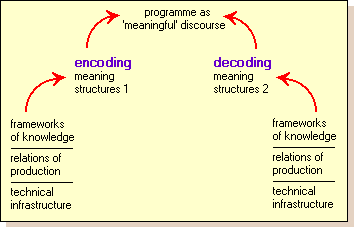Lesson 11: Encoding/Decoding
Hall's Model of Mass Communication
'decodings do not follow inevitably from encodings'
In his essay, originally published as 'Encoding and Decoding in Television Discourse' in 1973
the British sociologist Stuart Hall proposed a model of mass communication which highlighted the importance of active interpretation within relevant codes.
 In contrast to the earlier models, Hall thus gave a significant role to the 'decoder' as well as to the 'encoder'.
In contrast to the earlier models, Hall thus gave a significant role to the 'decoder' as well as to the 'encoder'.
Hall referred to various phases in the Encoding/Decoding model of communication as moments.
John Corner's definitions for the term "moments" (Corner 1983, 266):
the moment of encoding: 'the institutional practices and organizational
conditions and practices of production';
the moment of the text: 'the... symbolic construction, arrangement and
perhaps performance... The form and content of what is published or broadcast'; and
the moment of decoding: 'the moment of reception [or] consumption...
by... the reader/hearer/viewer' which is regarded by most theorists as 'closer to a
form of "construction"' than to 'the passivity... suggested by the term "reception"'
Mass media codes offer their readers social identities which some may adopt as their own. But readers do not necessarily accept such codes.
Umberto Eco uses the term 'aberrant decoding' to refer to a text which has been decoded by means of a different code from that used to encode it (Eco 1965).
Eco describes as 'closed' those texts which show a strong tendency to encourage a particular interpretation - in contrast to more 'open' texts (Eco 1981).
He argues that mass media texts tend to be 'closed texts', and because they are broadcast to heterogeneous audiences diverse decodings of such texts are unavoidable.
Class assignment (group work, done orally):
Watch the video and describe what you have seen in terms of encoding/decoding communication model.
Can this situation be considered as a metaphor?
|
Resources for Lesson 11:
Chandler, Daniel. Semiotics for Beginners.
Hall, Stuart ([1973] 1980): 'Encoding/decoding'. In Centre for Contemporary Cultural Studies (Ed.): Culture, Media, Language: Working Papers in Cultural Studies, 1972-79 London: Hutchinson, pp. 128-38
Corner, John (1983): 'Textuality, Communication and Power'. In Davis, Howard & Paul Walton (Eds.) (1983a): Language, Image, Media. Oxford: Basil Blackwell, pp. 266-81
Eco, Umberto (1965): 'Towards a Semiotic Enquiry into the Television Message', In Corner & Hawthorn (Eds.) (1980), pp. 131-50
Eco, Umberto (1981): The Role of the Reader. London: Hutchinson
Smith, Frank (1988): Understanding Reading. Hillsdale, NJ: Erlbaum
Olson, David (1994): The World on Paper: The Conceptual and Cognitive Implications of Writing and Reading. Cambridge: Cambridge University Press
Jakobson, Roman (1960): 'Closing Statement: Linguistics and Poetics'. in Sebeok, Thomas A (Ed.) (1960): Style in Language. Cambridge, MA: MIT Press, , pp. 350-77
Foucault, Michel (1970): The Order of Things. London: Tavistock
http://www.sjsu.edu/faculty/wooda/171/171syllabus4chapter2.html
http://www.fanpop.com/spots/ugly-betty/articles/15640
Myers, Kathy (1983): 'Understanding Advertisers'. In Davis, Howard & Paul Walton (Eds.) (1983): Language, Image, Media. Oxford: Basil Blackwell , pp. 205-223
|
Пермский государственный университет
|